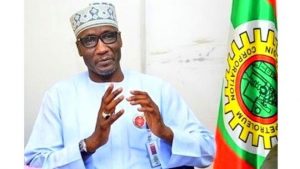
The Nigerian National Petroleum Corporation has incurred the sum of N274.03bn as subsidy payment for Premium Motor Spirit popularly known as petrol between January and May this year.
The figure is contained in the NNPC Report for June which the Corporation submitted to the Federation Account Allocation Committee.
The Report was obtained on Thursday in Abuja.
The Committee, headed by the Minister of Finance, Mrs Zainab Ahmed is made up of Commissioners of Finance from the 36 states, representatives of revenue generating agencies such as NNPC, Federal Inland Revenue Service, Department of Petroluem Resources, Central Bank of Nigeria, Nigeria Customs Service among others.
A breakdown of the N274.03bn subsidy payment showed that the NNPC incurred the highest sum of N126bn in the Month of May this year.
This is about 45.98 per cent of the entire N274.03bn subsidy paid by the NNPC since this year.
Further analysis of the Report showed that the Corporation paid the sum of N25.37bn as subsidy in February while March and April had N60.39 and N61.96bn respectively.
The Federal Government had in the 2021 budget abolished the payment of fuel subsidy as no provision was made for such expenditure.
It was exclusively reported that as a result of the non-provision of fuel subsidy in the 2021 budget, the burden of the N1trn federation account remittance shortfall has been pushed to the Nigerian National Petroleum Corporation in the form of under recovery that would arise from the price differential between the landing cost and pump price of petrol.
Since the deregulation of the downstream sector of the petroleum industry last year, which led to the removal of fuel subsidy, there had been a push by the Nigerian Labour Congress and other stakeholders for the reintroduction of fuel subsidy.
With the deregulation of the downstream sector last year, the price of petrol had risen from N121.50 to N123.50 per litre in June, to N140.80-N143.80 in July, N148-N150 in August, N158-N162 in September and N163 in November.
Since November last year, the price of Premium Motor Spirit popularly known as petrol had remained unchanged despite the increase in crude oil prices in the international market.
As of the time the fuel subsidy was removed in June last year, the price of crude oil was about $45 per barrel.
But as of Wednesday, the price of crude oil had risen to about $71 per barrel. This price is far higher than the 2022 Federal Government budget benchmark price of $57 per barrel.
What this means is that while expectations are high that there would be more revenue to be earned from crude oil sales by the NNPC for the government, the adverse effect would be on the imported price of crude oil.
And with the continuous push for subsidy, it therefore means that the NNPC has been made to bear the burden of subsidy payment through the reintroduction of under recovery.
The implication of this is that with the under recovery element of cost being borne by NNPC with subsidy reintroduction, the amount that is being remitted by the Corporation into the Federation Account has been significantly reduced.
For instance, the statutory payments made by the NNPC to the Federation Account, a joint pool operated by the local, state and federal governments, declined by over 63 per cent in the first five months of 2021.
An analysis of the data from NNPC, the corporation was only able to remit N225.85bn out of the prorated total sum of N613.83bn.
A breakdown of the N225.85bn showed that the NNPC remitted N90.86bn in January, N64.16bn in February and N41.18bn in March.
While the Corporation did not remit any amount in April, it was able to pay the sum of N29.647bn into the Federation Account in May.
The Minister of Finance Mrs Zainab Ahmed, had during the public consultation of the Medium Term Expenditure Framework/Fiscal Strategy Paper for 2022-2024 described the amount spent on subsiding petrol as a drain on the economy,
She said that a whopping sum of N900bn will be spent next year in subsidizing the price of Premium Motor Spirit, adding that such would have been spent on more productive sectors of the economy such as health, education and infrastructure.
Ahmed said, “This is costing us big time. We are spending over N150bn on subsidy, that means NNPC has to use that amount of money to pay for PMS and distributing it. That is money that the federation account can share.
“This is money that could have been available for education, health and infrastructure. reduce our borrowing, increase the amounts that states and local governments are collecting.
“We are being penny wise pound foolish to think that by giving this subsidy, that citizens are benefitting. But by the end of the day, the citizens are actually the ones that are carrying the brunt of the wealthy.”
The Finance Minister lamented that while subsidy was supposed to be enjoyed by the poor, those that are actually benefiting from it are the rich people in the society.
She added, “Some (the rich) have two, three, four cars and they are the ones that we are subsidizing.
It is not helping the farmer who needs a bus from his farm to the market.
But we need to get rid of subsidy completely, although it is not a popular view with labour.
“Right now, , we are subsidizing consumption in Nigeria, we sell at N165 per liter when our neighbors are selling at N500 per litre. It is only the marketers that are benefiting by taking this product from from Nigeria and selling it across borders. The common man is not benefiting.
“The transition is not an easy one if we have to remove the subsidy. What are the alternatives? What can we provide for Citizens? So we are projecting we’ll be paying at least N900bn subsidy for next year.
“Imagine what we could have done with that amount. How many schools you can build, how many health center.
It is not wise, it is not wise because we are hurting our economy.”
An analysis of the 2022 Federal Government spending showed that the projected subsidy budget of N900bn is higher than the N292.7bn for sinking fund, N750.03bn personnel cost for Government Owned Enterprises, and N335bn overheads cost,
It is also higher than the N261.2bn budgeted for overhead costs for Government Owned Enterprises; N567.02bn for pension, gratuities and retirees; and N366.13bn capital supplementation budget.
The International Monetary Fund had last month expressed its concerns on the resurgence of fuel subsidies, as it reiterated the importance of introducing market-based fuel pricing mechanism.
This was disclosed by the IMF team led by Ms. Jesmin Rahman via a statement issued after a virtual meeting with the Nigerian authorities.
In the statement, the institution emphasised the need to deploy well-targeted social support to cushion any impact on the poor.
“The mission expressed its concern with the resurgence of fuel subsidies. It reiterated the importance of introducing market-based fuel pricing mechanism and the need to deploy well-targeted social support to cushion any impact on the poor.
“The mission recommended stepping up efforts to strengthen tax administration to mobilize additional revenues and help address priority spending pressures,” it stated.
 DailyrecordNg …Nigeria's hottest news blog
DailyrecordNg …Nigeria's hottest news blog








